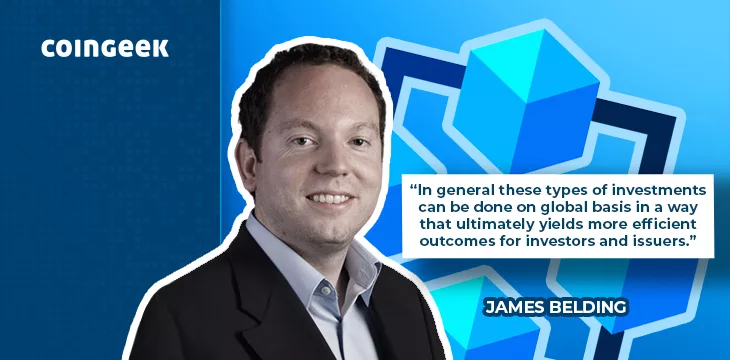
|
Getting your Trinity Audio player ready... |
Joshua Henslee hosted the latest CoinGeek Roundtable, where he spoke to Garrett Krause, James Belding, and Eli Afram about tokenizing gold on the BSV blockchain.
Who are the Roundtable guests?
Joshua Henslee is the host. He’s a Bitcoin thought leader and developer in the BSV blockchain ecosystem. Henslee will be familiar to most CoinGeek subscribers and regular readers.
Garrett Krause is the CEO of WorldVest. He’s launching TroyMoney on the BSV blockchain. His project will tokenize gold as well as other precious metals and commodities. It will also offer stablecoins.
James Belding is the CEO of Tokenized. He’s working with Krause to create TroyMoney. Tokenized makes it easy to issue and trade tokens on the BSV blockchain.
Eli Afram co-founded Amleh, a gold tokenizing platform and vault. He’s a serial entrepreneur and is involved in multiple BSV blockchain-related projects.
Why tokenized gold?
Krause answers this question first. Being in gold mining, he has had many friends ask him how they can get into gold. He knows there’s demand for gold as money, and so he decided to tokenize it. After some early failures on Ethereum due to its technical limitations, he encountered Belding, who convinced him to try it on the BSV blockchain.
Belding says tokenizing gold makes things more efficient for users and issuers globally. It also makes it more divisible and lowers fees and friction. “Cheaper, better, faster,” he says, summing up the spirit of the BSV blockchain. He believes this is the first step into a better, more interconnected financial system in which blockchain technology, smart contracts, and tokenization play a role.
Afram points to Peter Schiff’s presentation at the London Blockchain Conference. He says much of what he wants to say was said in that speech. Gold has always been reliable money, and as Schiff said, it will likely be the private sector that reintroduces it as such. Fiat currencies are inflationary, and so many merchants will prefer to accept gold as it holds its purchasing power. Scraping off little chunks of gold isn’t feasible, but tokenized gold could well catch on as money.
Who is the target customer?
Krause says this transcends the digital currency industry and enters a global market. Gold is the second most traded commodity after oil. It’s also quite hard to buy and secure, and this will make both of those easier. With the transparency of the blockchain and trusted partners like Brinks, he believes TroyMoney will appeal to gold bugs worldwide. “The world is the buyer,” he says.
Belding says he is one of the target customers as he intends to invest a little. Tokenizing gold on the blockchain helps people in countries without great payment systems and with weak fiat currencies. Many people in the world believe it’s a good idea to hold gold as a percentage of your savings.
Afram explains that, right now, one of the major problems with gold is accessibility. Owning physical gold requires quite a bit of capital that is beyond most people. This technology will change the game and make it more accessible and liquid. There are also some transparency issues in the gold industry, and the transparent nature of the BSV blockchain can help with those. Half the solution is the blockchain, and the other half is tokenization, he says.
Will there be a minimum transaction amount once the TroyMoney app is launched?
Krause says the aim is to have no minimums or maximums. While there’s still some testing going on, the tiny transaction fees on the BSV blockchain make micropayments in gold feasible. The aim is to sell $2 or $3 worth at a time, and getting in or out shouldn’t have a minimum or maximum.
Belding says they’ll go for one-tenth or one-hundredth of a U.S. cent or equivalent. Users will be able to switch between grains, grams, or ounces. They’ll observe and see how people use it. He sees the only potential constraint being bank fees when getting in or out, but secondary markets can help with that issue.
What controls will there be for users to get in?
Krause tells us that the same AML/KYC controls that govern the financial system will apply when using TroyMoney. There’ll be a one-time process, and a third party will handle it. “We have to have identity,” he says, noting that TroyMoney’s liquidity provider, Stonex, will also need to know who it’s dealing with.
Belding elaborates that all on and off-ramps will require KYC verification. Even holding the assets backing everything is subject to abuse and carries risk. Customer and investor protection is important, and compliance with regulations is essential. In his view, it’s in everyone’s interest and is very reasonable.
What are the technical challenges when tokenizing tangible assets like gold? How does BSV blockchain address them?
Afram explains that most challenges aren’t technical—they’re process-related. His firm used the services of Elas Digital, so they mostly handled the technical side of things. Onboarding, offboarding, etc., pose the most challenges. However, if digital currency exchanges start listing the token, they will handle a lot of these processes.
Belding says many wallets don’t have multisig elements, the capacity to handle atomic swaps, and can’t handle the sort of divisibility required. He’s been in the trenches trying to work all of this out. Many risks have to be managed, and functions have to be straightened out for this to be used in global commerce.
Is TroyMoney looking to become a stablecoin or just gold-backed money?
Belding replies that you could have a stablecoin that doesn’t have the features that allow it to become money. They want to make it useful, meaning it can be used for transactions, is divisible, scalable, etc. Stablecoin/gold-backed money are interchangeable terms.
Krause says TroyMoney will have both EUR and USD stablecoins. Eventually, they want to have all pairings. A tokenized system makes it easy to have multiple coins and types of money.
To hear the panelists’ thoughts on Peter Schiff, the BRICS dollar, the premiums around gold and silver coins, and more, watch the CoinGeek Roundtable via the link above!
Watch: What is the ideal blockchain to back gold?

 11-22-2024
11-22-2024


